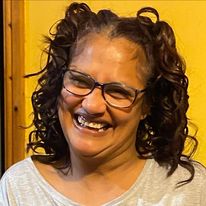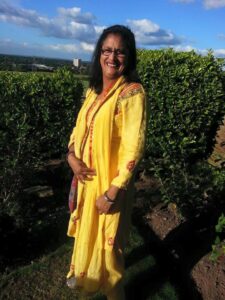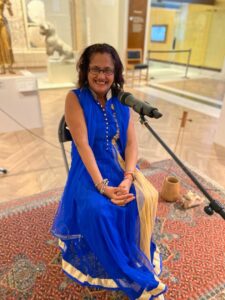
JULIA LEE BARCLAY-MORTON – YOGA, WATER AND REWRITING AUTISM
I interviewed writer Julia Lee Barclay-Morton about her experience of autism. Julia began as an experimental dramatist in New York, moving to the UK to


I interviewed Kuli Kohli who says about herself: “I was born with mild cerebral palsy in northern India and moved to England at an early age. I am a creative writer, poet, mother, wife and full-time council worker. Having the ability to write has made my life richer and more rewarding.” Kuli helps run Blakenhall Writers’ Group and has established a new writers’ group dedicated to Punjabi Women in Wolverhampton.
Leslie: Can you describe, please, how cerebral palsy has affected you. What are the typical issues you face every day?
Kuli: I was born with mild cerebral palsy. It affects me in many ways. I have difficulties with basic things such as walking, talking, hearing, handwriting.
I cannot carry drinks and I find it very difficult to eat in public places. The fear of dropping drinks and food causes real embarrassment to me. I have difficulty walking and crossing roads because of poor balance and unexpected spasms causing me to fall without reason. I have damaged my fingers/wrist/knees/shoulders because of repeated falls over the years. I live with pain but when it’s bad I usually take pain relief in the form of medicines/ heat packs/ cold packs and massage which is helpful for a while.
Leslie: How does the rag doll metaphor you use fit your experience? Was it an idea that came from childhood and how does it apply in detail?
Kuli: The metaphor ‘rag doll’ is an exact reflection of my personality and how I feel as a person living with CP. I used to have a big rag doll when I was a child and that inspired me to write The Rag Doll poem.
Leslie: Why have you called your novel ‘Dangerous Games – What Will People Say?’
Kuli: I have called my novel ‘Dangerous Games – What Will People Say?’ because it’s all about living as a second generation Asian, disabled, vulnerable and very gullible girl with her sister in Britain. All the stuff that they got up to with a bunch of bad boys – experimenting and straddling two different cultures – was real. The two sisters’ behaviour is different at home because they have to listen to their parents and live the way they want them to live in a Punjabi culture as if they were brought up in India. However, the girls wanted to experience and explore the British way of life and going out secretly.
Leslie: How would you characterise living with cerebral palsy in an Asian household in Britain? Can you describe a few incidents/anecdotes that show people what that experience is like?
Kuli: As a child other kids would call me handicapped – a word I despised. I’d be stared at and pointed at. Going to the Gurdwara (Sikh temple) was an ordeal. I hated it because people just used to stare at me, making me feel unimportant, alienated and invalid.
I was often teased by other children and I recall being asked: “Why do you walk like that and talk like that?” But I never responded, because I didn’t understand who I was myself.
As I got older, it was harder for me to communicate. The mild cerebral palsy made life more daunting, and the simple tasks of expressing how I felt or what I needed became more and more difficult for me. I wanted to be like my friends and like the people I watched on the TV and Indian cinema. I wanted to be able to join in discussions and conversations. I just sat in a corner and pretended to be ‘fine’.
Leslie: Could you describe, please, what’s special about the Asian Punjabi Women’s Writing Group you run?

Kuli: I was determined to inspire and empower, other women in a similar situation as me, so I set up a Punjabi Women’s Writers Group in Wolverhampton.
Every month I lead a handful of Punjabi women at Wolverhampton Central Library, a place where we can all express ourselves through writing and poetry. It is a safe place to express freely. The Punjab is a vast area of northern India, there are many different cultures/religions/faiths who live and work there. These include: Hindus, Sikhs, Muslims, Jains etc
I am protective of who can attend and sit in on these sessions. I want to maintain wellbeing and the women need to feel safe and free of any judgment from men, something they have dealt with their whole lives.
The women would often write about how they feel, the alcoholism of family members and domestic abuse. Not forgetting the bright side of Punjabi life like food and fashion. We write in English but add the odd words/phrases of Asian languages in our writing.
Leslie: What has cerebral palsy made you like as a person and what personal achievements has it led to that you might not have thought were possible?
Kuli: CP has made me a little shy, stubborn and sometimes annoying, especially with physical activities I wanted to do but the CP made it impossible such as walking, running, driving, cycling, exercising etc.
All the negative things I was told I could not do as an adolescent, I achieved. I would never have thought I would get married, have 3 children, own my own home and hold down a job for 30 years in the council.

My writing has been a very important part of my life and when I joined Blakenhall Writers Group my passion was recognised by the Literature Development Officer in Wolverhampton Council 10 years ago. This is when all my writing and poetry achievements started materialising.
I never dreamt of performing my poetry at live gigs and attending seminars and universities around England to share my experience as a disabled, Asian woman writer/poet. I certainly did not think it would take me places like Berlin, The British Museum and Greenwich University in London, Liverpool and Delhi.
Leslie: In what ways has cerebral palsy been a gift?
Kuli: Cerebral palsy has been a gift because it’s turned me into a writer and poet. I can write stories and poetry from a different angle that’s not been explored in detail before.
CP has protected me against being exposed as a woman mainly because my personal issues and problems were not taken seriously. CP has also given me opportunities that I would not have otherwise had like developing hobbies in birdwatching and attending a Special School and being taken on trips into nature and the seaside where I experienced a more British way of life.
Without the CP, I would have been just an average Punjabi woman, and maybe more successful in the conventional way of life.
Leslie: Is there anything else you’d like to talk about?
Kuli: I wanted to mention I was commissioned by Multistory in March 2020 to write a poem for the Sandwell Stories/Stories In Isolation project. I wrote Black Country Wonder Woman as a response to the Multistory commission. I thought that my experience of Sandwell as a pregnant disabled woman from Wolverhampton would tell a real Sandwell story. Twenty years ago, at a time of strikes and the anxiety of having a premature baby in difficult circumstances, would be a good way to express the fear that we’re feeling during the lockdown now. And in collaboration with my son, Akaash, rapping some verses gives my story that personal touch at a distinctive angle.
Next week I interview photographer and theologian Werner Ustorf about his left-leaning ‘Agnostic Lutheranism’ and his writings about the Western-Aboriginal encounter in Central Australia.
ABOUT LESLIE TATE’S BOOKS:

I interviewed writer Julia Lee Barclay-Morton about her experience of autism. Julia began as an experimental dramatist in New York, moving to the UK to

I interviewed Gillean McDougall from Glasgow, who edited the collaborative projects Honest Error (on Charles Rennie Mackintosh and his wife Margaret Macdonald) and Writing the

I interviewed French writer Delphine de Vigan, whose book, No et moi, won the prestigious Prix des libraires. Other books of hers have won a clutch

I interviewed Joanne Limburg whose poetry collection Feminismo was shortlisted for the Forward Prize for Best First Collection; another collection, Paraphernalia, was a Poetry Book Society Recommendation. Joanne

I interviewed Katherine Magnoli about The Adventures of KatGirl, her book about a wheelchair heroine, and Katherine’s journey from low self-esteem into authorial/radio success and
| Cookie | Duration | Description |
|---|---|---|
| cookielawinfo-checkbox-analytics | 11 months | This cookie is set by GDPR Cookie Consent plugin. The cookie is used to store the user consent for the cookies in the category "Analytics". |
| cookielawinfo-checkbox-functional | 11 months | The cookie is set by GDPR cookie consent to record the user consent for the cookies in the category "Functional". |
| cookielawinfo-checkbox-necessary | 11 months | This cookie is set by GDPR Cookie Consent plugin. The cookies is used to store the user consent for the cookies in the category "Necessary". |
| cookielawinfo-checkbox-others | 11 months | This cookie is set by GDPR Cookie Consent plugin. The cookie is used to store the user consent for the cookies in the category "Other. |
| cookielawinfo-checkbox-performance | 11 months | This cookie is set by GDPR Cookie Consent plugin. The cookie is used to store the user consent for the cookies in the category "Performance". |
| viewed_cookie_policy | 11 months | The cookie is set by the GDPR Cookie Consent plugin and is used to store whether or not user has consented to the use of cookies. It does not store any personal data. |
3 responses
Another amazing guest, Leslie. She has achieved so much, already, and it is evident there is much more to come. Thanks for introducing us to Kuli and good luck to her in all her future projects.
🙂 🙂 🙂
I have really enjoyed reading this Kuli. You are an inspiration and I love the Rag Doll poem which is an interesting metaphor for you. Keep going, keep creating and take good care. Blessings Raine